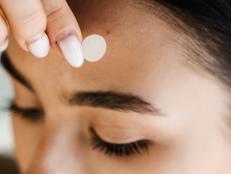Everything You Should Know About Tourette Syndrome and Tic Disorders
As Baylen Dupree shares her experiences with Tourette Sydrome on Baylen Out Loud, here's all the info you need to know about it and other Tic Disorders. Catch the premiere on January 13 at 9/8c!

TLC
Baylen Out Loud's Baylen Dupree is a vibrant and resilient 22-year-old with Tourette Syndrome. Every day, she faces a variety of extreme and uncontrollable vocal and motor tics while navigating the challenges of becoming an independent adult.
Learn more about Tourette Syndrome and other Tic Disorders below.
What Is Tourette Syndrome?
Tourette Syndrome is a neurodevelopmental disorder that is part of the spectrum of Tic Disorders and is characterized by sudden, involuntary movements and/or sounds called tics. Individuals with Tourette Syndrome experience at least 2 motor tics and 1 vocal tic occurring for more than a year which are not due to another known medical condition.
According to the US Department of Justice, Tourette Syndrome is legally recognized as a disability and those who live with TS are afforded every legal protection that they are entitled to under the law, including the Americans with Disabilities Act.
83% of people living with Tourette Syndrome also face co-occurring conditions like ADHD, OCD, Anxiety, and other disorders.
The mission of the Tourette Association of America (TAA) is to provide help and hope to those affected by Tourette Syndrome, Tic Disorders, and associated conditions through Awareness, Research, and Support.
Prevalence
According to the US Centers for Disease Control and Prevention (CDC), the current prevalence estimates of Tourette Syndrome (TS) and Persistent Tic Disorders are:
- 1 of every 160 children between the ages of 5-17 in the United States lives with TS
- 1 of every 50 children lives with TS or another Persistent Tic Disorder
Data suggests that about half (50%) of US children with TS are undiagnosed.
Personal Impact
According to the TAA’s 2022 Impact Survey:
- 72% of children and 87% of adults with TS or another Tic Disorder experience physical pain because of tics.
- 48% of adults and 23% of children with TS or another Tic Disorder have considered suicide at some point.
- 84% of adults with TS or another Tic Disorder experience social difficulties related to having tics.
- 80% of children with TS or another Tic Disorder felt that tics negatively impacted their school experience.
- 66% of children with TS or another Tic Disorder were forced to miss school or have extended absences. Tics can lead to social isolation and discrimination.
Members of our community are often unable to enjoy many aspects of our society that most people take for granted because they fear becoming the subject of ogling and ridicule from strangers. Movie theaters, public transportation, supermarkets, libraries, classrooms, and many other public places may present a traumatic and potentially dangerous situation.
In other instances, individuals living with TS are accused of misrepresenting, exaggerating, or faking their tics and may be denied access to necessary accommodations at work and at school.
Pharmacological Treatment and Management of Tics
There is no medication that cures tics in TS, but some medicines can help reduce their severity.
Regularly, doctors prescribe medicines used to treat other conditions that have also been found to reduce tics severity, including treatments for ADHD, OCD, depression, psychosis, or various diseases. Individuals may work with their physicians for several months or years to identify a specific solution that both effectively reduces tic severity while minimizing negative side effects, which can be further complicated by the shifting nature of tics.
Deep Brain Stimulation (DBS) is a surgical option for very severe tics that don’t respond to other treatments. It involves placing electrodes in the brain to help control movements.
Comprehensive Behavioral Intervention for Tics
• The TAA convened the Behavioral Sciences Consortium in 2001 to work collaboratively to develop nonpharmacological treatments for tics. This resulted in a TS-tailored behavioral therapy and piloted research studies on the resulting therapy, known as Comprehensive Behavioral
Intervention for Tics (CBIT).
CBIT helps train patients to be more aware of their tics and the urge to tic and teaches them to pursue competing behavior when they feel the urge to tic. It also helps patients determine positive changes to day-to-day activities in ways that can be helpful in reducing tics. Although there is no question that tics are neurological in nature, they are often also extremely sensitive to the environment in which they occur, which means behavioral treatments can be helpful.
Coprolalia and Copropraxia
Coprolalia is the medical term used to describe the involuntary and uncontrolled utterance of obscene words or offensive, socially inappropriate and/or derogatory remarks. Copropraxia is a related complex motor tic symptom involving obscene or other socially inappropriate gestures. Together, these symptoms are described as “coprophenomena.”
The majority of people living with TS do not experience coprophenomena. While some estimates indicate that as few as 10% of people living with TS experience these types of tics, there is evidence that the stigma surrounding this aspect of the condition has led to an underreporting of these symptoms occurring at some point in individuals’ lives.
However, the general public often erroneously believes that coprophenomena is a common symptom of TS. This is due in large part to the majority of media representations of the condition focusing primarily on these symptoms. The presence of coprophenomena symptoms is not related to one’s intelligence or character, nor do these symptoms represent willful or intentional behaviors.
Understanding and acceptance of the symptoms of TS and other Tic Disorders including coprophenomena is a key element in helping people with tics lead full and productive lives.
Find Support and Learn More
To find support or to learn more about Tourette Syndrome and other Tic Disorders, please contact the Tourette Association of America at tourette.org or by calling 718-224-2999.
YOU MIGHT ALSO LIKE:













.jpg.rend.hgtvcom.231.174.suffix/1699480866087.jpeg)

